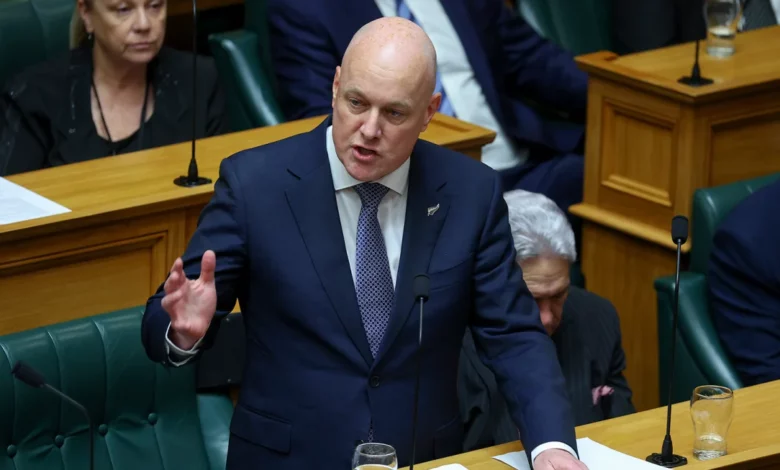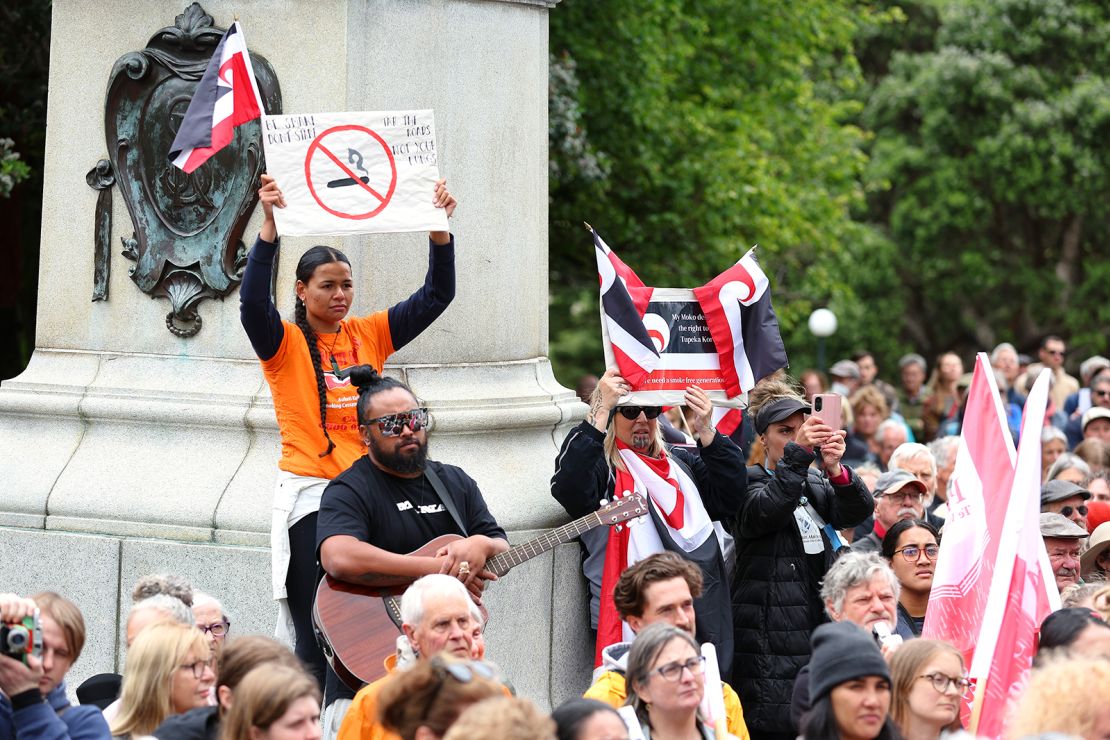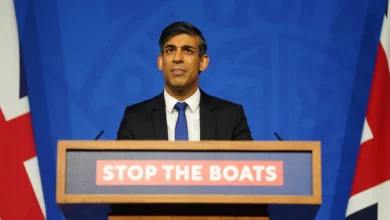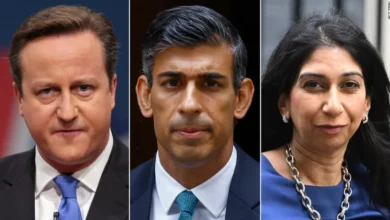
New Zealand’s new right-leaning government took more than a month to take shape, but Prime Minister Christopher Luxon and his coalition partners are now racing to strip back policies that had earned former leader Jacinda Ardern plaudits worldwide amongst progressives.
While a swing to the right was predicted, the pace of change under the Nationals’ Luxon has startled observers, and his coalition’s moves to ditch policies seen to favor the country’s indigenous people has seen critics quickly accuse them of being “anti-Māori.”
Under Luxon, the government is proposing to dissolve the country’s Māori Health Authority, rollback the use of the Māori language, and end the country’s limits on tobacco sales – a move Māori leaders had sought to cut high rates of smoking among their people.
“Your attacks on our culture have motivated our standing in solidarity,” the co-leader of the Te Pati Māori party, Debbie Ngarewa-Packer, blasted across the parliamentary aisle in the capital Wellington this month.
The same day, the Māori King, Tūheitia Potatau Te Wherowhero VII, issued a royal proclamation calling for a “national hui” – a coming together of the country’s indigenous people, to discuss “holding the new coalition government to account.”
Many New Zealanders feel the same, with tens of thousands of people turning out across the country for anti-government demonstrations hastily arranged by Ngarewa-Packer’s party.
“It was a dignified shot across the bow,” Ngarewa-Packer told CNN of the protests on December 5. “To say we won’t accept this. And that this is what we can do in a short amount of time.”
“Do I think that the Prime Minister will listen? He has to,” Ngarewa-Packer said, adding that the world is watching the Luxon government.
“I think it’s a humiliating position for a first time Prime Minister to be in,” she said.
Speaking at a news conference on the day of the protests, Luxon said the criticism of his new government was “pretty unfair.”
“We are determined that Māori are going to do better under our government than they have in the last six years,” he said.
Voter backlash
Ardern resigned as Prime Minister in January, handing the leadership to her deputy Chris Hipkins, who attempted to refocus their Labour Party’s policies on the cost-of-living crisis.
But it wasn’t enough to extend Labour’s time in office.
While Ardern won fans around the world for her compassionate response to the 2019 Christchurch terror attack, her position on climate change and by championing working mothers in politics, her domestic legacy is far more contested.

Failed Auckland infrastructure projects led to accusations of wastefulness at a time when the Labour’s “wellbeing budgets” dramatically increased payments to underprivileged families. Farmers protested legislation to curb agricultural emissions and protect waterways.
Before the vote, the leaders of the new conservative coalition government, made up of The National Party, New Zealand First, and ACT New Zealand, had all promised to unwind some of Arden’s legacy.
Right-wing candidates railed against the Labour’s perceived expansion of New Zealand’s long-held principle of co-governance, designed to ensure Māori representation in administrative bodies. And in the lead-up to the vote, some Māori candidates complained of racist abuse.
The election on October 14 saw a flurry of deal-making as Luxon sought to shore up his thin margin with smaller players.
In late November, the new partners published a 100-day plan under which initiatives designed to benefit Māori will be rolled back, including a vow to dissolve the Māori Health Authority established in 2022 with a mandate to improve the health of indigenous people.
The plan also backflips on Ardern’s world-leading ban on the sale of cigarettes to people born after 2008 – also seen as anti-Māori as some 20 percent of Māori adults smoke, far higher than the national average of 8 percent.

Organizations such as The Māori Women’s Welfare League, that works to empower Māori women and children, have vowed to hold Luxon accountable on his assertion that Māori health outcomes will be improved by what his government argues will be a reduction in red tape.
“They are not things that are dreamed up in five minutes. They are established because of evidence over time,” Māori Women’s Welfare League President Hope Tupara said.
“We saw (the Ardern administration) increasing the amount of government investment into Māori health solutions by Māori providers on the basis of ‘by Māori for Māori.’
“We have an expectation of the kinds of public services that are available to us as part of the population, which I think is reasonable.”
Richard Shaw, a professor of politics at New Zealand’s Massey University, described Luxon’s government as “the most explicitly anti-Māori government” he could remember.
“This is the first government that I can recall which has quite explicitly said, ‘we’ll have less of that,’ not ‘we’ll have more of it,’” said Shaw.
“So, this really is an awkward, unsettled moment.”
Culture wars
New Zealand’s voters in October stripped Hipkins’ Labour Party of 31 seats to almost half their previous stature in the country’s single-chamber parliament – a crushing defeat that leaves them in an awkward position.
But the victors may never feel completely comfortable either. New Zealand’s mixed member proportional voting system means parties rarely govern alone.
Luxon’s National Party, which won just over 38 percent of the vote is forced to govern in coalition with the far smaller, and less moderate New Zealand First and ACT New Zealand parties. Both junior coalition parties will drag Luxon to the right.
New Zealand First has long opposed the official use of Māori terms, from road signs to government departments. The party says the widespread practice of referring to New Zealand by the country’s Māori name, Aotearoa, is an example of “virtue signalling and politically correct extremism.” Luxon says his government will adopt an “English first” approach.
ACT is forcing Luxon to entertain the possibility of a future referendum on the principles of New Zealand’s Treaty of Waitangi, a document signed by the colonial British regime and Māori in 1840 that enshrines principles of co-governance between indigenous and non-indigenous New Zealanders.
While Luxon says the proposed referendum would “go no further” than a debate by a parliamentary select committee, the open questioning of the usefulness of the treaty may diminish it as a historic declaration of equality, warns academic Shaw from Massey University.
For Tupara, from the Māori Women’s League, New Zealand’s current political moment is not just a passing culture war.
“We have been fighting the government since the 1800s, so this is not new to us,” she said.
“This fight for our own identity is nothing new to us. I think the level of opposition to what we have achieved for ourselves is something that I haven’t seen in my lifetime.”
Ngarewa-Packer’s Māori political party wants to harness the power of that historic fight to win modern political battles in New Zealand.
She says she has a broad coalition of progressive New Zealanders who will support her, Māori and non-Māori.
“Within less than 72 hours, we were able to mobilize tens of thousands across the country, with no resourcing, completely using our social media. It was a test to ourselves, to see if we had the capability, the capacity to mobilize an alliance,” she said.
“Sometimes you need this revolting, backwards politicking to remind people why we participate.”




